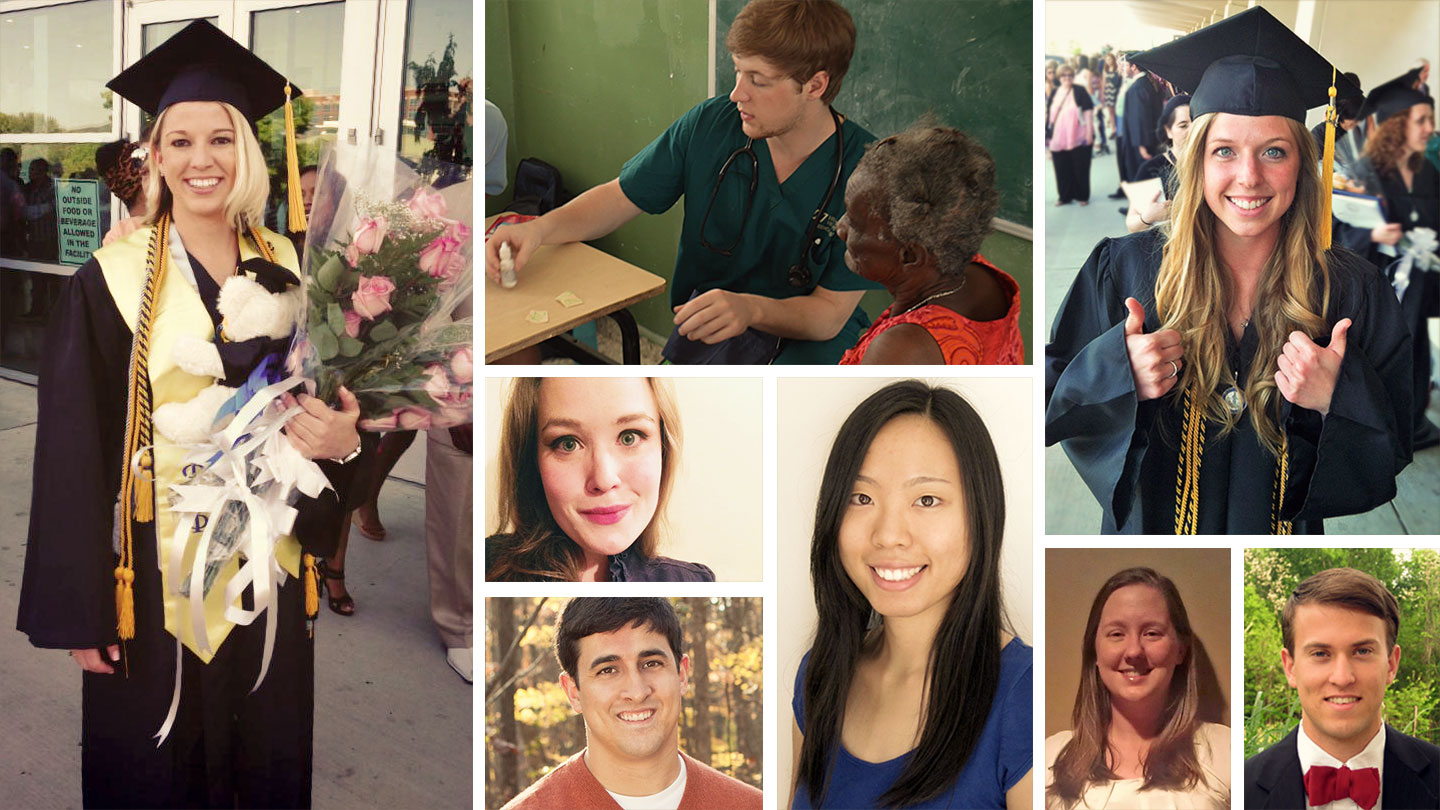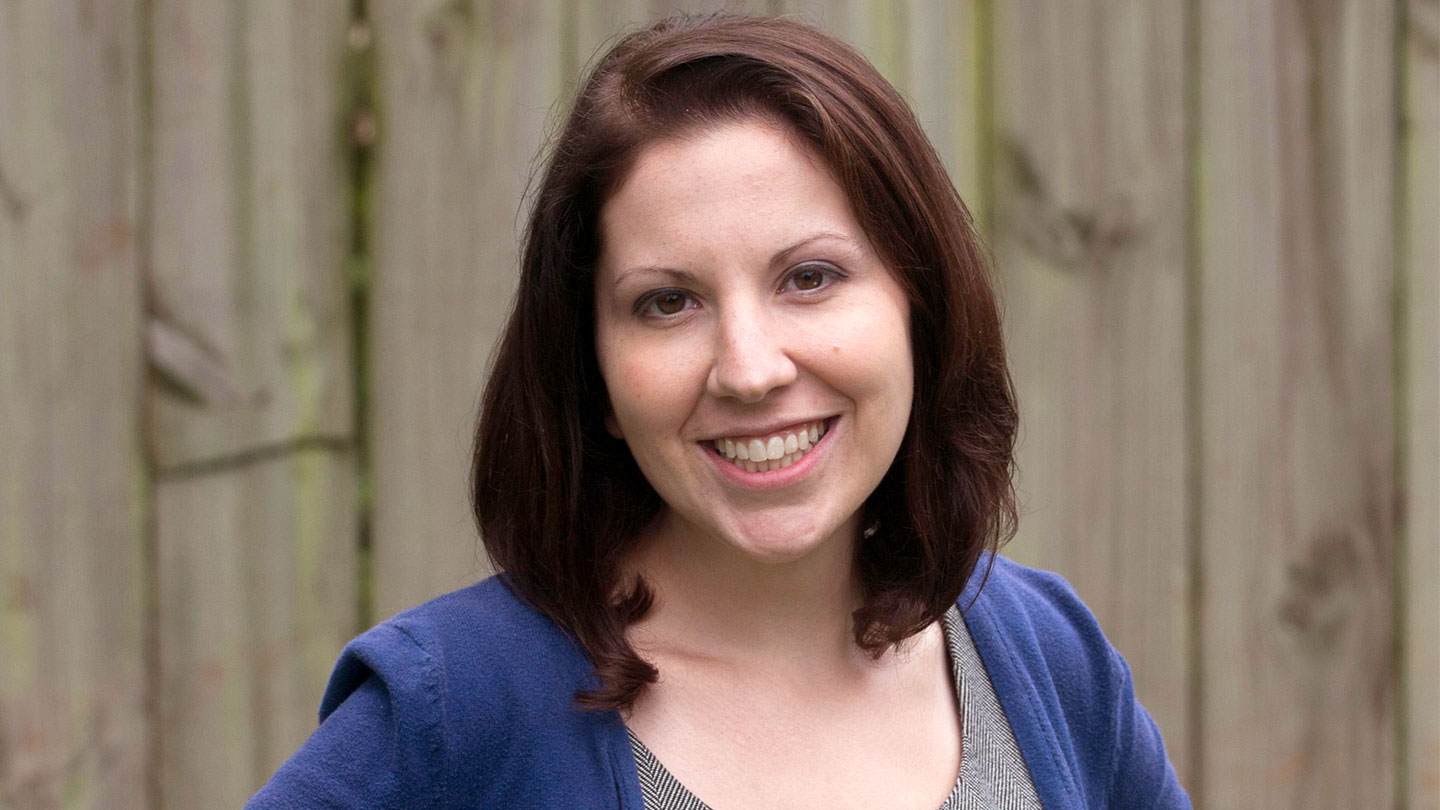UAH pre-health program helps students pursue healthcare dreams

UAH graduates Mary Dobbins, Nathan Judge, Stacey Sargent, Adam Powell, Diana Alsbrook, Iris Lin, Patrick Roush, and Samantha DeMers (clockwise) are all heading to professional school to pursue degrees in the healthcare field.
Getting into a professional school to pursue an advanced degree in the healthcare field is no easy feat, as any doctor, dentist, pharmacist, or veterinarian can tell you. But the students in the Pre-Health Program at The University of Alabama in Huntsville (UAH) must have missed that memo, because their acceptance rate blew the national average out of the water this past year.
"Pre-health students are a group of dedicated, ambitious, and driven individuals," says Dana Warner, UAH's Coordinator of Pre-Health Professions. "The 2013-2014 cycle of pre-health students who applied for 2014 acceptance to professional school were a remarkable bunch. I am delighted to work with them, know their stories, and see their future career paths unfold."
So what's the secret to their success? As Warner is quick to point out, there's no one sure path to getting into professional school for a healthcare career. In fact, quite the opposite, as many schools look for students with diverse and unique experiences. But one thing is certain. The journey starts with a strong and innate desire to help others.
"I have been unbelievably blessed throughout my life, and for this I am incredibly grateful," says Nathan Judge, who will head to UAB's School of Medicine at the end of the month. "Knowing how much I have been given, I want to use my abilities to help others. My desire to help people, coupled with my interest in the scientific aspect of medicine, naturally steered me toward medicine."

Dana Warner serves as UAH's Coordinator of Pre-Health Professions.
Like Judge, Adam Powell says he feels "called to be a servant," a calling that only intensified when he took classes to become an emergency medical technician. "I have so many opportunities and blessings, so I decided medicine was the best way to use those in service," says Powell, who will attend the University of South Alabama College of Medicine this fall.
Stacey Sargent, meanwhile, was inspired by her own experience after undergoing surgery and nine months of rehab for an injury she sustained as a member of the UAH volleyball team. "I would not have been able to compete as a D2 collegiate athlete without the help of my physical therapists and athletic trainers," says Sargent, whose physical therapy doctoral program at UAB begins this spring. "I want to be able to give to others what my therapists gave me: hope and/or a second chance."
For several students, the feeling of wanting to give back coincided with an early exposure to the healthcare field. Diana Alsbrook, for example, volunteered at St. Jude Children's Research Hospital as a youth. Now, the Memphis, Tenn., native will return to her hometown in August to begin classes at the University of Tennessee Health Science Center College of Medicine.
"I have wanted to be a doctor since I was a little kid, before I really even knew what being a doctor meant," says Alsbrook, whose father is a nurse. "I have a huge passion for science and medicine, but in my years of growing up around the hospital and shadowing doctors in the past years, it's become so much deeper than that."
And the same is true of Samantha DeMers, who will soon be starting a surgical physician assistant program at UAB's School of Health Professions. She too had a childhood interest in medicine, though in her case it crystallized during her undergraduate career. "I apprenticed under a clinical herbalist for three and a half years," she says, "which underscored the importance of patient education, communication, and collaboration to empower individuals to advocate for their optimal health."
Of course, it takes more than desire and passion to succeed in one of the toughest fields. Just ask Patrick Roush, a native of Austin, TX, who plans to add an M.D. from the University of Alabama School of Medicine to the M.S. in Engineering he earned from UAH. "There is no replacement for hard work and dedication in route to a career in a health field," he says. "Strong academic performance can't hurt your chances, whereas poor performance can be detrimental."
And that's just half of the equation. The other half is extracurricular activities, a must for rounding out a graduate school application. "Your involvements are going to be the main topic of the interview," says Alsbrook. "I shadowed a whole lot and I shadowed many different specialties in medicine. It gave me so many great things to talk about when physicians and medical students interviewed me."
Thus, whether it was taking part in student-run organizations like UAH's Medical Careers Club and the UAH Biology Society, or going on medical missions to rural villages, all the pre-health students made a conscious effort to get involved outside of the classroom. "These experiences were crucial to learning more about what it is like to be a doctor," says Iris Lin, who will head to the University of Virginia School of Medicine this fall.
They can also make for a very busy schedule, adding to what is already by its nature a challenging path. "The pre-health process is far more difficult and time-consuming than I ever thought before I began the process," says Judge, adding that there's no time to lose. "The application process does not start at the time you actually begin submitting applications to schools. It starts the day you decide to go into the health field."
The pre-health program helps to walk you through the required steps, which can make all the difference when you're facing those daunting admission rates.
Fortunately, these students had more than a little help along the way from Dana Warner and the Office of Pre-Health Professions Advising. Open to students and alumni alike, the office provides everything from shadowing and volunteer opportunities to advice on personal statements and resumes, mock interviews, and support for UAH's student organizations – all of which can be invaluable to those unfamiliar with the process.
"Applying to medical schools is a long and grueling process, and it was very, very helpful to have already gone through the UAH pre-health process before facing the 'real thing'," says Lin. "The pre-health program helps to walk you through the required steps, which can make all the difference when you're facing those daunting admission rates."
Mary Dobbins, who will soon head to UAB's School of Health Professions, agrees with Lin. "The pre-health program was a significant factor in my success at getting accepted to physical therapy school," she says. "Dana is incredibly knowledgeable about the application process and helped me prepare and stay on track."
Many students also say Warner's moral support was just as crucial as her professional advice. "She really cares about doing everything she can to make the entire process as easy as possible, from beginning to end," says Alsbrook. Adds Sargent, "she was extremely encouraging throughout my interview experiences and really wanted to keep up with how they were going."
That's key when facing "a roller coaster ride with highs of confidence and lows of frustration and hopelessness," says Roush. "It helps to find the things that keep your morale up and focus strong, and Dana and the pre-health program provide an excellent start. She was always available to provide one-on-one guidance for improving competitiveness as an applicant."
Applicants no longer, these graduates can now share their own wisdom and experience with a new crop of aspiring healthcare professionals. Naturally that comprises much of what has made their journeys so successful, like the importance of staying determined – and optimistic – in spite of the hard work and setbacks they will inevitably face.
"Understand that healthcare is not an easy career to obtain, but is one of the most fulfilling and rewarding careers," says Sargent. "You will often feel overwhelmed, but if you can focus on the heart of why you want to be in healthcare – to help others – you will overcome the obstacles you face."
Alsbrook concurs. "Becoming a healthcare professional is hard work, the application process is long and stressful, the pre-requisite classes will challenge you all the time, but trust me, it will all be worth it," she says. "Stay motivated and remember why you wanted to do this in the first place."
But it also includes more practical advice, like getting started early and using all available resources. Take it from DeMers. "I knew of the pre-health program prior to graduation, but did not pursue finding out more about what the program could offer until I decided to apply to graduate school," she says. "I had severely underestimated the helpfulness and insight the members of the program offered."
Now, she continues, she makes sure others don't make the same mistake. And she's not the only one. "I can say without hesitation that UAH's pre-health program fully prepared me for the next step in my medical education," says Judge. "Anytime I meet a pre-health student at UAH, the first thing I tell them is to meet with Dana!"
Contact
Dana Parcher Warner
256.824.4714
prehealth@uah.edu
